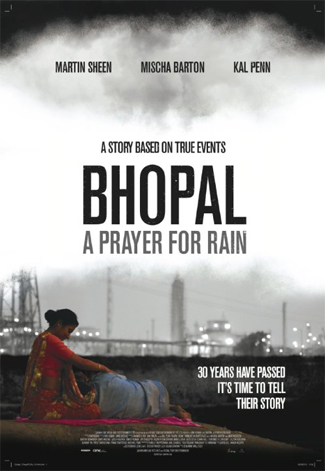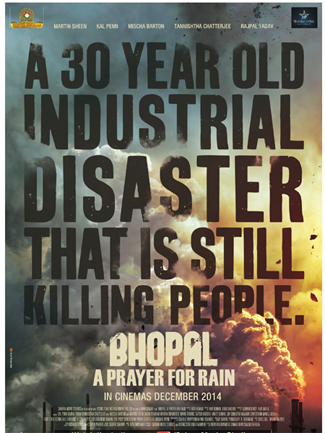 Before even the first scene of Bhopal: A Prayer for Rain unfolds, if you know the story, then you know you are in for a film that will move you, and even more, anger you more than you thought possible. It tells the story of the tragedy of the Bhopal Union Carbide Corporation Chemical disaster in 1984. It was the biggest man-made industrial disaster in history. Ten thousand men, women and children died in one night, and for thousands more the effects of the disaster are still felt today.
Before even the first scene of Bhopal: A Prayer for Rain unfolds, if you know the story, then you know you are in for a film that will move you, and even more, anger you more than you thought possible. It tells the story of the tragedy of the Bhopal Union Carbide Corporation Chemical disaster in 1984. It was the biggest man-made industrial disaster in history. Ten thousand men, women and children died in one night, and for thousands more the effects of the disaster are still felt today.
The Ravi Kumar directed film stars Martin Sheen, Mischa Barton, Kal Penn, Raajpal Yadav, Satish Kaushik, Fagun Thakrar and Tannishtha Chatterjee in pivotal roles.
The story that Bhopal: A Prayer for Rain tells is fiction combined with hours of research. Ravi Kumar said in his Director’s notes, “Over six years and 10 drafts, we spoke extensively to Bhopal survivors, victim support groups, and the Carbide staff who had worked at the plant. We also studied the correspondence between the US headquarters of Union Carbide and its Indian subsidiary, which ran the plant. The result is an effective blend of hard facts within a fictional narrative in the story.”
One of the most moving things about this docudrama film is that it puts a human aspect to the horrific tale and it makes the tragedy felt so much more.
Official synopsis:
“Rickshaw driver Dilip, played by Rajpal Yadav, and his wife Leela, played by Tannishtha Chatterjee, live in grinding poverty, in debt to the local moneylender and are desperately looking for the funds to pay for the wedding of Leela’s sister. They live in the slums around the Union Carbide factory, the lights of which, seen through Dilip and Leela’s eyes, radiate benevolently over the town, representing only progress and prosperity.
Dilip lands a job at the Union Carbide plant. The job is tough with long hours; everyone is desperate to hold on to their pay cheque and so Dilip keeps quiet when he notices managers at the plant ignoring safety standards.
Dilip’s long time friend, Motwani (Kal Penn), a tabloid journalist, knows that Bhopal residents complain of the constant stench in the air and wake up at night choking from the gas. He is on a mission to expose what he believes is a deadly time bomb ticking away in his home town. He feels as if no one will listen, but when he meets feisty American journalist, Eva (Mischa Barton), he sees a ray of hope and persuades her to confront Carbide executive Warren Anderson (Martin Sheen). As Eva and Motwani endeavor to delve deeper into Carbide’s activities, Dilip is using every resource necessary to pay and plan for his sister’s wedding. When the wedding night arrives the family is full of joy and celebration as two families join together as one. But as the music plays, an invisible catastrophe is working its way throughout the town and wedding party. One by one the guests start to feel unwell. The largest tower at the Carbide plant spews poisonous gas into the night air; one by one they collapse, and one by one they unknowingly become a statistic in the world’s largest chemical disaster to date.”
If you can believe it, nearly thirty years later as the plant stands as a ghost-like constant reminder, the water in Bhopal is still contaminated and one person a day dies as a direct result of the tragedy. To this day, Carbide has never been prosecuted for the disaster, or offered any kind of apology. In the end, we learn that Union Carbide only paid $470 million in compensation, which was only $2,000 per victim.
 The performances:
The performances:
Raajpal Yadav is brilliant in his role as Dilip. He speaks with his eyes, with his body and you feel every emotion from the desperation, to the pride, to the insecurity, the happiness and finally the utter betrayal and despair. One of the finest performances I have ever seen on film.
Tannishtha Chatterjee is wonderful and is the heart of the film. I loved her relationship with Dilip and it made the tragedy of this unimaginable disaster so much more real.
Martin Sheen embodies Carbide executive Warren Anderson and it is brilliant casting. In every speech he gives or line he says, you are convinced that Anderson believes he is doing what he really feels is right, and that this plant is a good thing for Bhopal and India. Then you get to his utter refusal to see the disaster waiting to happen and his passing the buck and refusing to take blame… He hits all those notes as well… only he can… perfectly.
Kal Penn makes an impression as Motwani, but I did feel as if he was playing a part. He has some fine moments but it still felt like a little bit of a costume and character he put on and he was not truly encompassing the role.
Special shout-out to Fagun Thakrar, though in a minor role, she moves you with just a look into her eyes. She is fabulous.
Many other minor roles also deserve special recognition including Joy Sengupta who played Roy among others. The entire cast is wonderful.
Though I feel the film and the story do present this crime on a more human and devastating level, I do wish there was even more. I felt like in parts that it was missing something, especially in the investigative arc. I wanted more and I guess that is a good thing, but for me it lacked depth in some sections of the story.
The representation of the corporation sadly is so true and so infuriating and frustrating, and it makes you want to join in the fight to make sure this never, ever, ever, ever happens again. The ending scenes when the gas began to leak will stay with me forever.
The music must be mentioned because it really added to the feel and the flavor of the happier scenes in the film. Also Sting’s song during the final credits is a haunting ending.
In the end, this film is an absolute must see. This story must be told and people must be made aware so that something like this can never occur again. Again I must quote Ravi Kumar who wrote in his notes, “The reason for making this film is not to play the blame game, but learn from history so another tragedy can be avoided. Although many excellent documentaries have been made on the subject, there has been not been a major fiction film produced for a world audience. We wanted to make an international feature film with major stars for the world audience who do not know about the tragedy. To present it in an entertaining format so they can enjoy the drama and at the end they can go home and Google it.” YES!
For me it is a call to arms to know more, to do more and to applaud the makers, the actors of this film for opening my eyes even more to the human rights travesty that was Bhopal.
I cannot give this film a rating, as it is so much more than that. I can only simply say it is important that everyone see this devastating tale, to learn, to know, to feel and to act.








